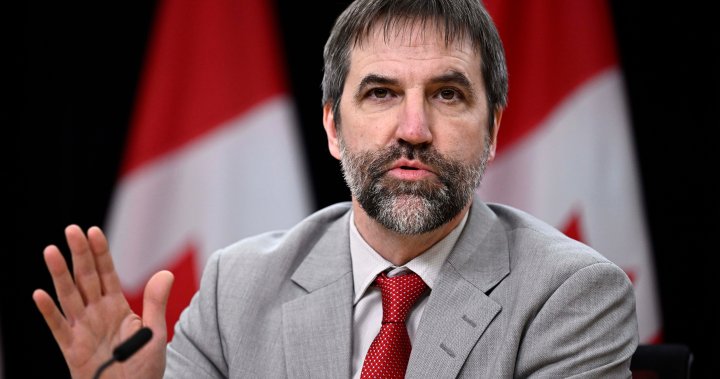Canada has released a new draft plan that the government says will help cut methane emissions from the country’s oil and gas sector by at least 75 per cent.
Federal Environment Minister Steven Guilbeault made the announcement Monday at the ongoing UN climate conference, also known as COP28, being held in Dubai.
Two years ago at COP26, as part of the Global Methane Pledge, Canada committed to developing a plan to reduce oil and gas methane emissions by at least 75 per cent below 2012 levels by 2030.
Canada is one of more than 150 countries signed onto the 2021 Global Methane Pledge, which aims to slash overall methane emissions worldwide by 30 per cent below 2020 levels by 2030.
“I’m very happy to announce the release of even more ambitious draft methane regulations for Canada’s oil and gas sector, consistent with the International Energy Agency’s recommendation,” Guilbeault said Monday.
“We’re eliminating most exclusions from the existing regulations,” he said, adding that “virtually all of Canadian facilities handling natural gas will be covered.”
A federal review found in 2021 that Canada was on track to hit its current regulatory target of cutting methane output from oil and gas by 40 to 45 per cent by 2025, but more recent reports suggest methane leaks and releases are not well-documented.

Under the new draft regulations, Canada would eliminate the routine venting and flaring of oil and gas infrastructure, which can cause large amounts of methane to enter the atmosphere.
Methane doesn’t stay in the atmosphere as long as carbon dioxide, but it is better at trapping heat, so cutting methane emissions is considered one of the most effective ways of tackling climate change.
“We’re also establishing new performance standards for leak detection and repair, focusing on sites with the highest risk,” Guilbeault said.
That means facilities with equipment that has greater potential for emissions will be required to undertake more frequent inspections, according to a release from Environment and Climate Change Canada.
The proposed rules would also see the introduction of an audit system, requiring one annual third-party inspection to validate company program results, ECCC said.
Alberta, Saskatchewan react to Ottawa’s plan
The new rules, which will start rolling out in 2027, were opposed by both Alberta and Saskatchewan.
Alberta Premier Danielle Smith, who is also at COP28, called the proposed regulations “costly, dangerous, and unconstitutional.”
“Once again, the federal government is setting unrealistic targets and timelines. Infrastructure can only be updated as quickly as technology allows,” she said in a statement.
Smith said Alberta will not impose a total ban on flaring at this time, calling it ”a critical health and safety practice.”

The proposed regulations include an exemption for safety reasons.
Alberta is one of three provinces that uses its own methane regulations for the 2025 target, however those regulations were adjusted through negotiations with Ottawa to ensure they would hit the same reductions.
Ottawa signed an equivalency agreement with Alberta, Saskatchewan and British Columbia for them to use their regulations.
Saskatchewan also criticized the proposed regulations, saying the rules were stepping into provincial jurisdiction.
“This amounts to a production cap by default and is another instance of federal overreach and changing goalposts,” the Saskatchewan government said in a statement.
“It also violates the current equivalency agreement, which Saskatchewan signed with the federal government in 2020.”

The federal government is estimating that the draft methane regulations would result in the emissions reduction of 217 million metric tonnes of carbon dioxide equivalent from 2027 to 2040.
Also on Monday, the federal government announced an investment of $30 million to establish a Methane Centre of Excellence.
Guilbeault said this would improve Canada’s understanding and reporting of methane emissions, with a focus on collaborative initiatives to support data and measurement.
Canada is the world’s fourth-largest oil-producing nation.
According to a 2022 federal report that looked at Canada’s emissions of methane, more than 95 per cent of those emissions come from three sources: oil and gas, which makes up 38 per cent of methane emissions; agriculture, which makes up 30 per cent; and waste or landfills, which make up 28 per cent.
“There were also smaller amounts of methane emissions from other sectors, such as transportation, residential buildings and coal mining,” the report said.
Methane contributed about 13 per cent of Canada’s total emissions in 2021.
— with files from The Canadian Press and Reuters
© 2023 Global News, a division of Corus Entertainment Inc.




